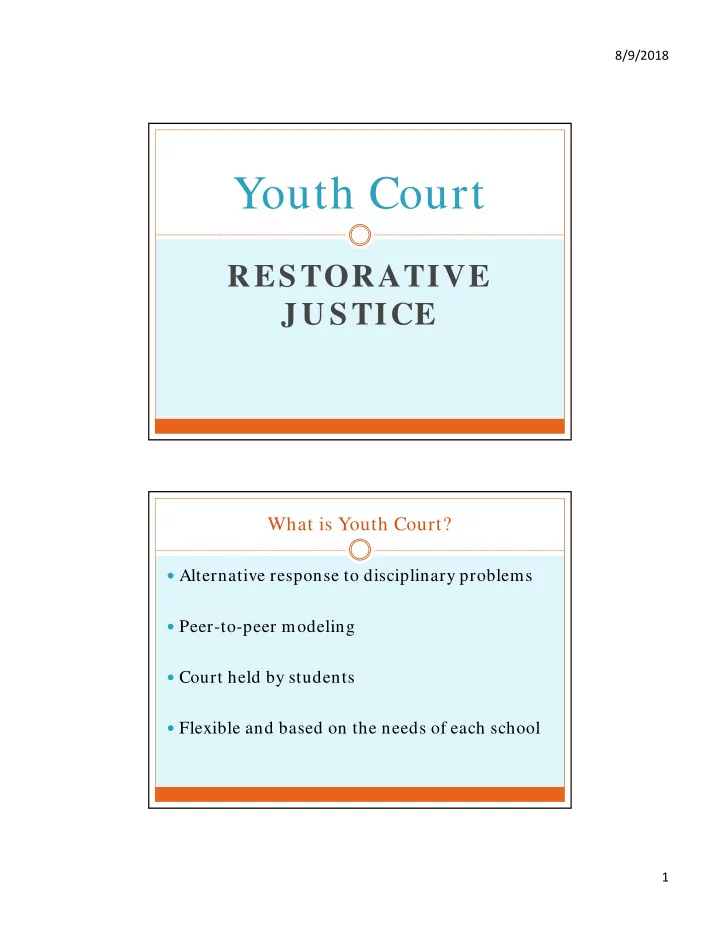

8/9/2018 Youth Court RESTORATIVE JU STICE What is Youth Court? Alternative response to disciplinary problems Peer-to-peer modeling Court held by students Flexible and based on the needs of each school 1
8/9/2018 Why Youth Court? Skill development for students Demonstrates power of civic engagement Students are force for positive change Creates school environment focused on support rather than punishment Youth Court Components Addresses lower-level offenses Avoids adjudication Voluntary participation Diversion from traditional disciplinary process Fosters leadership development Non-adversarial approach – Youth must admit to behavior 2
8/9/2018 Youth Court Goals Support students in learning how to modify behaviors and make better choices Provide constructive alternatives to suspension, detention, and other exclusionary disciplinary practices Strengthen school culture and community through positive peer pressure and student leadership What is Restorative Justice? Hypothesis: People are Happier More cooperative and productive More likely to make positive changes . . . when authority figures do things w ith them, not to them or for them 3
8/9/2018 Youth Court as Restorative Justice Recognizes personal strengths Creates a voice for those negatively impacted by offenses Prepares and supports students to respond to negative behaviors in their community Creates activities that allow students to repair harm and make positive contributions to the community Challenges to Youth Court Willingness to allow restorative justice practices in place of traditional punishment Willingness to empower students and trust decision- making Staffing for court if it is an extra-curricular activity 4
8/9/2018 Current Youth Court Chambersburg Area Senior High School (CASHS) Operating since 2017 No cost to students or schools Training by Educators, Juvenile Probation, and Attorneys Successful completion of 90% of cases Key Decisions Curricular vs. extra-curricular Types of cases Sanctions 5
8/9/2018 Youth Court Options Youth Court as part of school curriculum Ideal due to consistency, scheduling, training, and opportunities to learn about criminal justice system Best case scenario – Youth Court is part of 9 th or 10 th grade Civics Students are trained in restorative justice Cases are heard as part of that class period Youth Court Options Youth Court as voluntary program held after school Relies on volunteers Students have to find time after school to attend 6
8/9/2018 Cases Appropriate for Youth Court Low-level infractions Vandalism and theft Truancy and chronic lateness Verbal altercations and conflicts Insubordination Some instances of fighting Restorative Sanctions Must repair harm Must address individual needs Decrease repeat offenses Takes into account the individual’s ability to complete assigned tasks Focus on learning new skills rather than punishment Sanctions are created by students 7
8/9/2018 What We Offer Training for teachers and staff Training for students Some financial support for items such as laptops and printer paper Volunteers to speak to classes about criminal justice issues What We Need Decision on Youth Court as afterschool program or curriculum Decision on types of infractions to be addressed by Youth Court School administration support to use Youth Court as an alternative Use of facility for training and court function 8
8/9/2018 Youth Court Supporters Franklin County Criminal Justice Advisory Board (CJAB) CJAB Juvenile Justice Committee Franklin County District Attorney’s Office Franklin County Bar Association through the Young Lawyers Association Pennsylvania Bench Bar Association through the Pro Bono Services Franklin County Juvenile Probation Office Franklin County Children’s Round Table Contact Information Kati McGrath Franklin County Juvenile Probation Office 425 Franklin Farm Lane, Chambersburg, PA 17202 Phone: 717-261-3122 Email: kamcgrath@franklincountypa.gov Kim Eaton Franklin County Day Reporting Center 550 Loudon Street, Chambersburg, PA 17201 Phone: 717-261-0450 or 717-360-5692 Email: kmeaton@franlincountypa.gov 9
8/9/2018 Reference Volz, G., Saiyed, S., Laubach, K., Williams, N., Levy, T., Rodriquez-Schroeder, J., & Fan, Z. (2016). Youth court training manual (5 th ed.). Philadelphia, PA. Thank You! TH AN KS FOR YOU R TIM E AN D CON S ID ER ATION 10
Recommend
More recommend